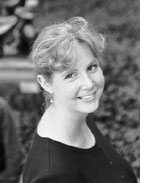
Fall
1999
Crossing linguistic and cultural boundaries
Super-power sense and sensibility
![]()
![]()
Soundings is a publication of the School of Humanities and Social Science at MIT
Comments and questions to www-shss@mit.edu
Hidden gems
Vox populi:
vulgarity
and beyond
 Her
face and demeanor are all sweetness and light. With rose in her cheeks
and wispy blond curls, she appears the ultimate ingenue, the quintessence
of Heidi on the mountain. But scratch the surface and you'll find
a healthy delight in the vulgar, the sensual, the passionate and raw.
Her
face and demeanor are all sweetness and light. With rose in her cheeks
and wispy blond curls, she appears the ultimate ingenue, the quintessence
of Heidi on the mountain. But scratch the surface and you'll find
a healthy delight in the vulgar, the sensual, the passionate and raw.
By day, Shannon Larkin passes as a senior secretary in the Office of Humanities, Arts and Social Sciences. Come late afternoon and beyond, she'll be trilling away in her clear, coloratura soprano, whether at home practicing or teaching, or on the stage, where she performs with the prestigious Handel & Hadyn Society Chorus, Boston Baroque Chorus, several church choirs and Et Cetera, the chamber ensemble she co-founded.
While Larkin finds singing a soulful experience"—"It gives me a singer's high and I get high as often as I can""—performing gives her an added adrenaline rush. "There's no other feeling like it. The song is telling a story and you can see in the faces in the audience that they not only hear and understand it, they're moved by it. And it's you who's managed to move them."
Particularly drawn to the early-Italian Baroque, Larkin says the repertoire is unlike anything that had come previously and not much that has come since: "It's vibrant, often very funny, but also edgy and sarcastic." She also appreciates the repertoire's lyrical subtext. "When someone sings about dying a thousand deaths, they're not talking about dying. They're talking about having an orgasm. Back then everyone knew it and they'd laugh uproariously. Today people think the singers are being sweet and poetic and don't realize how vulgar the music is. It's incredibly fun to bring out the vulgarity of it all."
Not that the demure blond is aiming solely for vulgarity. "If there's melodrama in the piece, we bring it out. If the music is about sheer despair and emotion, we bring it out. And some religious works have incredible outpourings of grief and you have to bring out the raw passion. Whatever the piece demands, we have to rise to it."
The price of standards
The down side is that Larkin's rigorous standards have a tendency to subvert her enjoyment. While attending others' performances, she finds herself thinking, "‘If she didn't keep her knees locked and if she stood up a little bit straighter, that sound would be so much more beautiful.' I can't just sit back and enjoy the concert."
On the lighter side, she feels strongly that the music is often taken too seriously. "A lot of people get all dressed up to go to concerts. They sit there and listen to the music and clap politely at the end of each piece. They don't look like they're enjoying anything. But so much of this music is supposed to be laughed at. In 17th-century Italy, if the audience didn't like something, they'd get up and throw fruit at the stage. We're trying to bring that back"—the feeling of being able to laugh in the middle of a piece or lean back and say, ‘Ahhh, I don't believe that.' But not sit there and be mousy quiet."
Despite her modest demeanor, Larkin is far from mousy. Consider the time she dyed her hair red"—not an elegant auburn, but a Bozo-the-Clown hue. Having read in a college psychology course that red hair gets more attention, Larkin was curious to test the reality. She discovered that people stopped opening doors for her and stopped talking to her in high-pitched voices. "Western civilization has very strong stereotypes about appearance," she explains. "People raise their voices when talking to blondes because they're assumed to be less intelligent; it's as if they're talking to a baby."
The anything-but-mousy approach was equally evident during her motorcycle riding days. Clad in leather and enormous engineer boots, Heidi on the mountain got on her Kawasaki EX500 cafe racer, opened the throttle and went for the gusto. "Oh yeah, it's a great feeling"—the freedom of the road and all that," she says dismissively. "But what I really liked was being directly connected to the road. If you shift your weight, you immediately feel the impact. When it rains, you get wet. When someone is burning leaves, you can smell it. It's just a wonderful experience."
Artistic flair often resides in unexpected places. In our Hidden Gems series, we profile the unsung artistry - visual arts, dance, music, theater, and poetry - found amidst the 350 faculty and staff of the School of Humanities and Social Science.